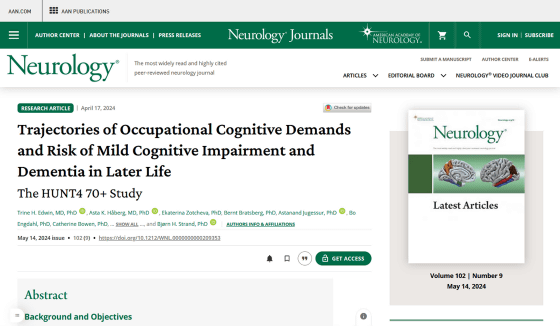Research shows that 'working with simple tasks is likely to cause cognitive decline'

Some people who work jobs that require high levels of mental strain or cognitive effort on a daily basis may be envious of those who work simpler tasks. However, a new study from Norway has found that people with more cognitively complex jobs have a lower risk of developing mild cognitive impairment and dementia as they age.
Trajectories of Occupational Cognitive Demands and Risk of Mild Cognitive Impairment and Dementia in Later Life | Neurology

Routine jobs raise the risk of cognitive decline by 66% and dementia by 37%, study says | CNN
https://edition.cnn.com/2024/04/17/health/brain-job-dementia-wellness/index.html
Mentally stimulating work plays key role in staving off dementia, study finds | Science | The Guardian
https://www.theguardian.com/science/2024/apr/17/mentally-stimulating-work-plays-key-role-in-staving-off-dementia-study-finds
A research team led by Dr. Trine Edwin, a researcher at Oslo University Hospital , analyzed data from a longitudinal study that followed more than 7,000 Norwegians from their 30s to 60s, and administered standard memory and thinking tests after the age of 70.
The subjects held 305 different jobs, and while some naturally changed jobs between their 30s and 60s, most stayed in jobs of similar cognitive demands. In other words, subjects who started out in jobs that were less cognitively stimulating tended to stay in similar jobs even if they changed jobs later in life.
The researchers classified jobs into different levels of cognitive complexity based on the amount of daily routine and mentally stimulating tasks, and the degree of analytical and interpersonal tasks involved in the job. They then classified participants into either no cognitive impairment, mild cognitive impairment, or dementia based on their results in cognitive tests administered from age 70 onwards.

Analysis of the data revealed that participants in the least cognitively demanding jobs had a 66% higher risk of developing 'mild cognitive impairment' and a 31% higher risk of developing 'dementia' compared to those in the most cognitively demanding jobs.
Among the jobs ranked as most cognitively demanding in the study were teachers and university lecturers, while those ranked as least cognitively demanding included highly routine jobs such as construction work, postal delivery and facilities management.
Of course, the jobs that were deemed cognitively demanding included routine tasks, but their daily work consisted mostly of cognitively demanding tasks such as creative thinking, analyzing information, solving unique problems, and explaining ideas and information. In addition, interpersonal skills such as teaching and motivating others were also factors that led to the jobs being deemed mentally stimulating.
Edwin explains: 'The most cognitively demanding occupation group included lawyers, doctors, accountants, technical engineers and civil servants, but the most common occupation was teachers. Teachers have a lot of interaction with students and parents and need to explain and analyse information. It's not a routine-oriented job.'

The study also found that attending college protected against cognitive decline, but only by about 60% to offset the effect of routine work. 'So education is very important, but how you use your brain in the work you do after you graduate is also important,' Edwin said. 'By engaging in cognitive activities, you're building up your cognitive reserve while you're working.'
In other words, even people who work routine jobs can prevent cognitive decline by getting more education or having entertainment that requires cognitive tasks outside of work. 'You're not destined to have cognitive decline. We can improve your future cognitive health through education and cognitively stimulating tasks,' Edwin said.
Related Posts:
in Science, Posted by log1h_ik







